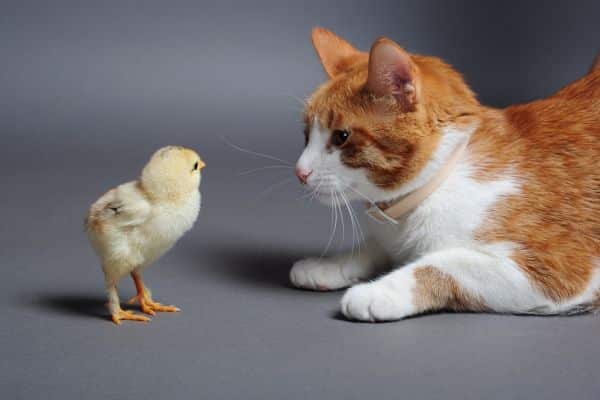Cats are known for their keen hunting skills, and their instinct to chase small creatures like birds and rodents is deeply rooted in their nature. If you’re a cat owner living near a pond, farm, or any place where ducklings are around, you might be curious or even concerned about the risks of your cat catching and eating these young birds.

Beyond the natural predatory behavior, there are important health and ethical considerations to weigh when it comes to no matter if cats can eat ducklings. In the article, Can Cats Eat Ducklings ,we’ll cover the potential dangers, including health risks and the impact on local wildlife, to help you understand why allowing your cat to eat ducklings might not be the best idea.
Natural Hunting Instincts of Cats
Cats are obligate carnivores, meaning their diet in the wild consists primarily of meat. Their bodies are designed to hunt and consume prey. This instinct is evident in domestic cats, who often chase after birds, mice, and other small animals. While this behaviour is natural, it poses several risks when the prey includes ducklings or other young animals.
Health Risks for Cats
- Parasites and Diseases: Wild animals, including ducklings, can carry parasites and diseases that can be transmitted to cats when cats eat ducklings. These include internal parasites like worms and external parasites like fleas and ticks. Wild birds can also carry diseases such as avian influenza and salmonella, which can infect cats and humans.
- Bones and Feathers: Ducklings have small bones that can pose a choking hazard or cause internal injuries if ingested by a cat. The feathers can also cause digestive issues or blockages, leading to serious health problems.
- Dietary Imbalance: While cats are carnivores, their diet should be balanced and nutritionally complete. Eating ducklings does not provide all the necessary nutrients that cats need. A diet based solely on wild prey can lead to deficiencies and health issues over time.
Ethical and Environmental Concerns
- Wildlife Impact: Allowing cats to hunt and eat wild animals, including ducklings, can negatively impact local wildlife populations. Cats are responsible for the decline of many bird species and other small animals, particularly in areas where they are not native.
- Cruelty: Hunting and eating ducklings can be seen as cruel. Ducklings are young and vulnerable, and their loss can have emotional and ecological impacts on their families and local ecosystems.
Preventing Your Cats eat Ducklings
- Supervised Outdoor Time: If your cat enjoys being outside, consider providing supervised outdoor time or creating a secure outdoor enclosure where they can enjoy nature without harming wildlife.
- Environmental Enrichment: Provide plenty of toys and activities for your cat indoors to keep them stimulated and reduce their desire to hunt. Interactive toys, puzzle feeders, and regular playtime can help safely satisfy their hunting instincts.
- Leash Training: Some cats can be trained to walk on a leash. This allows them to explore the outdoors safely without the risk of hunting wildlife.
Safe Alternatives for Natural Behaviors
- High-Quality Diet: Ensure your cat has a balanced diet that meets all their nutritional needs. This reduces their need to hunt for food.
- Interactive Play: Engage your cat in regular interactive play sessions using toys that mimic the movement of prey. Wand toys, laser pointers, and small balls can provide excellent stimulation.
- Cat Trees and Scratching Posts: Provide cat trees and scratching posts to give your cat an outlet for their natural climbing and scratching behaviours.
FAQs | Can Cats Eat Ducklings?
Q.1 Can cats get sick from eating ducklings?
Yes, cats can get sick from eating ducklings. Ducklings can carry parasites and diseases that can be transmitted to cats, such as avian influenza and salmonella. Small bones and feathers can also pose choking hazards and cause digestive issues.
Q.2 Is it natural for cats to hunt and eat small animals?
Yes, it is natural for cats to hunt and eat small animals due to their predatory instincts. However, this behaviour can pose health risks for the cat and negatively impact local wildlife populations.
Q.3 How can I prevent my cats eat ducklings?
To prevent your cat from hunting ducklings, provide supervised outdoor time, create a secure outdoor enclosure, or train your cat to walk on a leash. Additionally, ensure your cat has plenty of indoor enrichment activities to satisfy their hunting instincts.
Q.4 What should I do if my cat eats a duckling?
If your cat eats a duckling, monitor them closely for any signs of illness or digestive issues. Contact your veterinarian if you notice any unusual behaviour, such as vomiting, diarrhoea, or lethargy.
Q.5 Are there safe alternatives to satisfy my cat’s hunting instincts?
Yes, there are safe alternatives to satisfy your cat’s hunting instincts. Provide high-quality cat food, engage in regular interactive play sessions, and offer plenty of toys and activities indoors. Cat trees and scratching posts can also help mentally and physically stimulate your cat.
Q.6 Can hunting ducklings affect local wildlife populations?
Hunting ducklings and other small animals can negatively impact local wildlife populations. Cats are responsible for the decline of many bird species and other small animals, particularly in areas where they are not native. Keeping your cat indoors or providing supervised outdoor time can help protect local wildlife.
Conclusion | Can Cats Eat Ducklings?
While it may seem natural for cats to hunt and eat ducklings, there are significant health risks and ethical concerns. Allowing your cat to hunt can expose them to parasites, diseases, and injuries, and harm local wildlife populations. So, can cats eat ducklings safely? It’s better to offer safe alternatives, like toys or supervised play, to satisfy their instincts without the risks.
Also read : How to talk to your cat about gun safety